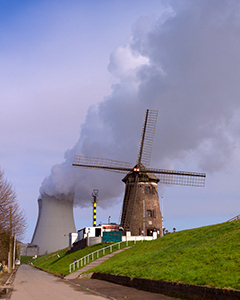Doel
 The first thing you notice in this village on the Scheldt Estuary east of the port city of Antwerpen is the shops, restaurant, and hotel–there aren’t any, and anything that resembles a civic structure is boarded-up and ready for demolition. Then you notice that the only other human beings are outsiders like you, running around and snapping photos of the ghost town. Then you turn a corner and come upon this nuclear plant cooling tower spewing steam over an ancient windmill on the polder, and you immediately get that Chernobyl feeling in your bones and crawling along your skin. How the hell did the Belgian government let you wander in here?
The first thing you notice in this village on the Scheldt Estuary east of the port city of Antwerpen is the shops, restaurant, and hotel–there aren’t any, and anything that resembles a civic structure is boarded-up and ready for demolition. Then you notice that the only other human beings are outsiders like you, running around and snapping photos of the ghost town. Then you turn a corner and come upon this nuclear plant cooling tower spewing steam over an ancient windmill on the polder, and you immediately get that Chernobyl feeling in your bones and crawling along your skin. How the hell did the Belgian government let you wander in here?
But it turns out that no, this isn’t a nuclear catastrophe, but the next worst thing–a European bureaucracy run amok. The port authorities, the Flemish Executive, and the money men behind them decided in 2008 that the Port of Antwerpen needed to expand, and if this 800-year-old village got in the way, too bad. If the authorities couldn’t pay the citizens to leave, they would send in demolition teams backed by riot police and simply destroy the village right under their feet.
Fortunately, the 200 Doelers have been able to fight back with that quintessential 21st-century weapon, publicity, and bring the port and its thugs to their knees. As they rightly point out, the current harbor isn’t even close to capacity, and there is already plenty of room for expansion within its current footprint. But in a script straight out of the pages of Kafka, the logic of human welfare is irrelevant, and all that matters to the port at this point is the exercise of its power without reference to the human beings it affects.
The Scheldt Estuary does in fact make this area one of the great natural harbors of the world, and the vast Flemish Plain behind it makes a perfect staging point for reaching the entire northern European market. So much so, that the Austrian, Spanish, and Dutch lords who ruled Flanders through most of its history spent considerable energy suppressing the trade here in favor of the city of Rotterdam upriver in the Netherlands. The price of Belgian Independence in 1830 was a virtual shutdown that lasted until the British Army arrived here in World War II and discovered the area’s natural strengths. So it’s no wonder that the Port of Antwerpen authorities come unhinged when anyone stands in the way of their expansion. But in the modern era, nothing is ever that simple.
If you read Dutch, the citizens of Doel will gladly chew off your ear at their website.
Filed under: Travels Tagged: Belgium, Travel




